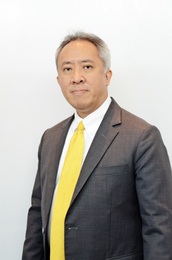 Supply chain management (SCM) costs make up as much as 80% of an enterprise’s total expenditures. That means a 10% savings in supply chain operations can translate into a massive 60% increase in profit while maintaining or improving quality. That’s according to Charlie Villaseñor, Chairman and CEO of the Procurement and Supply Institute of Asia (www.pasia.org), who will present a workshop on the United Nations Supply Chain Education Programme at the SAPICS 2015* conference, from 31 May - 2 June at Sun City. According to Villaseñor, improving ones business through the effective application of SCM principles is the way forward. “It’s clear that effective management of resources, processes and relationships with suppliers, contractors and customers is an essential task for every business. It can mean the difference between profit and loss, between success and failure.” “In order to streamline SCM, your business needs trained, competent managers to devise and implement required processes.” According to Villaseñor, who is on the Advisory Board of the MLS-SCM Program of the International Trade Centre – a joint agency of the UN and World Trade Organisation – there is an international drive to develop supply chain skills in emerging countries as a means of increasing export capability. “With the world’s economy shifting towards developing countries, Africa must be a particular focus – and given the potential that SMEs have to boost local economies, it’s chiefly SMEs that we want to see benefiting from supply chain management education,” he says. Villaseñor says helping companies to be more able to meet today’s challenging market conditions starts with equipping them with supply chain management (SCM) skills. “Sharp supply chain skills can do a great deal for your business. It’s time for small businesses to get skilled!” “Small businesses in South Africa can already benefit from globally recognised supply chain management certifications through SAPICS,” concludes Jenny Froome, SAPICS General Manager. “The APICS Certified Supply Chain Professional (CSCP) and Certified in Production and Inventory Management (CPIM) programs, DDI’s Certified in Demand Driven Planning (CDDP) and IBF’s Certified Business Forecaster are ideally suited to small businesses that recognise the positive influence these competencies can have their employees thus ensuring the company’s success.” *SAPICS Conference and Exhibition 2015 – The Pulse of Africa’s Supply Chains The presentation by Charlie Villaseñor at SAPICS 2015 will focus on the Modular Learning System for SCM (MLS-SCM) and the United Nations Supply Chain Education Programme. The 37th Annual SAPICS Conference and Exhibition is the premier educational and networking event in Africa for Supply Chain and Operations Management Professionals and will be held 31 May – 2 June 2015 at Sun City. The conference is widely known as the leading event in Africa for supply chain professionals and offers practical and relevant information through excellent educational presentations, case studies and interactive workshops. For more information and to register, visit www.sapics.org.za Photo caption: Charlie Villaseñor ENDS _________________________________________________________________________________________ MEDIA CONTACT: Cathlen Fourie, 012 644 2833, [email protected], www.atthatpoint.co.za  Real World Lessons You Won’t Learn at Business School Most Enterprise Resource Planning (ERP) implementations are way too complicated, with too few people in the organisation who understand how to apply it. That’s according to US-based business scientist and supply chain consultant Keith Launchbury (CFPIM, CIRM, CSCP), whose decades of experience in supply chain research have delivered a wealth of information on what really works when it comes to ERP. Launchbury will present a workshop on Overcoming the 10 Major Problems of ERP at the SAPICS 2015* conference, taking place from 31 May - 2 June at Sun City. Simple systems needed According to Launchbury, the problem begins with ERP software vendors who do not want to support customised versions of their systems. “That’s why they program their software to fit every conceivable type of business. This one-size-fits-all approach makes the ERP system excessively complex. The same ERP system can work in many different business environments, and while this is good for selling software to top management, it leaves the burden of implementation on middle management,” he says. The problem gets worse when Senior Management isn’t involved in the implementation process. “The correct implementation of ERP imposes strict disciplines in many businesses, and some organisations have difficulty kicking bad business habits,” he says. Towards a cross functional approach Businesses are organised around traditional functions such as sales, production, accounting, engineering etc., whereas Launchbury says successful ERP implementation requires a cross functional approach. “Some companies think that ERP implementation is an IT project, but you cannot simply migrate data from one software system to another. Successful ERP demands complete data integrity, and policies and procedures in place to ensure the ongoing accuracy of every piece of data in the system,” he says. This also requires a specially trained kind of person to handle the kind of integration that’s needed. Business generalists vs. specialists Successful ERP implementation requires a level of business integration that crosses multiple disciplines. “So, in order to be successful as a member of a cross-functional project team, a person must be capable of thinking outside the traditional box of their profession,” explains Launchbury. “Just as technology has become more mobile, so must our people. The more exposure they have to multiple disciplines the more valuable they will become.” To this end, Launchbury says what’s needed is a sharp move away from education that pushes people into traditional career paths in the silos that pervade most businesses. “People are restricted to narrow functional disciplines that do not reflect the reality of the world today. Take a subject like using 3D printers to create human organs from stem cells for example. Where does that fit in a traditional university curriculum? It is necessary for a researcher to understand the physics, biology, medicine, engineering, and legal issues involved,” he says. “Business today needs generalists not specialists. It is no longer good enough to understand one narrow discipline.” ERP of the future Another problem that Launchbury sees with ERP is that it is looking very dated. “Most ERP systems were developed several decades ago whereas today’s computers have advanced and changed dramatically since those mainframe days. We live in a world where data has to be mobile,” he says. While it may be difficult to imagine how SAP or Oracle could work on mobile devices, some companies are making good progress in research. According to Launchbury, Google is working on integrating ERP systems to mobile devices such as Google glass, wearable devices, smart watches, android phones and tablets. Also, applications like salesforce.com address the issues that are created when companies sell products by subscription using software as a service. “Furthermore, the advent of new technologies such as customised medicine, 3D printing, RFID tracking to avoid counterfeit goods, and cashless payments will force changes to the way in which we use ERP systems,” he says. “It’s simply not possible to effectively implement ERP in 2015 if you’re still using a system and approach that dates back several decades.” Want to find out more? Catch Keith Launchbury at SAPICS 2015*. The presentation by Keith Launchbury at SAPICS 2015 is entitled: Overcoming the 10 Major Problems of ERP: Real World Lessons They Won’t Teach You at Business School. The seminar is designed to help any person, team or company struggling to implement and get the full benefit out of their ERP system. During the seminar, he will distribute a checklist and conduct an interactive workshop, which will enable the companies in attendance to conduct their own assessment about how well their company is using their existing ERP system. It would be helpful if a team of people from the same company attended together, so that they conduct discuss their own issues and have an opportunity to work together on plans to increase their level of ERP performance. *SAPICS Conference and Exhibition 2015 – The Pulse of Africa’s Supply Chains The 37th Annual SAPICS Conference and Exhibition is the premier educational and networking event in Africa for Supply Chain and Operations Management Professionals and will be held 31 May – 2 June 2015 at Sun City. The conference is widely known as the leading event in Africa for supply chain professionals and offers practical and relevant information through excellent educational presentations, case studies and interactive workshops. For more information and to register, visit www.sapics.org.za About Keith Launchbury, CFPIM, CIRM, CSCP Keith Launchbury is a Business Scientist who has conducted extensive research with 130 different sized businesses from small one person operations to large multinational organizations, to uncover countless examples of what businesses do well, and what they don't do well. He is a widely recognized international speaker and authority in the area of Integrated Resource Management, Production and Inventory Management and Supply Chain Management, and he is certified in these three programs by APICS, the Society for Operations Management of which he was the International President in 1991. Keith won the Toyota Cup for the best presentation at the SAPICS conference in 2000. ENDS _________________________________________________________________________________________ MEDIA CONTACT: Cathlen Fourie, 082 222 9198, [email protected], www.atthatpoint.co.za For more information on SAPICS please visit: Website: www.sapics.org.za Twitter: @SAPICS01 LinkedIn: SAPICS group Facebook: OperationsManagement  It is easy to forget about those in need at a time of year where the focus on personal achievement is top of mind. Irrespective of the season embraced by the majority, there are still those whose biggest achievement centers on satisfying the most basic of needs. Poor food distribution is one of the key causes of global hunger, according to experts, who also blame high food prices and the unequal distribution of resources. According to the CSIR, globally between 30-50% of food produced is wasted before it reaches consumers. “This also results in environmental impacts throughout the supply chain, as well as the waste of resources used in food production and distribution,” says Claire Bloom, ex US Navy officer, and Founder and Executive Director of End 68 Hours of Hunger, a US-based non-profit organisation that fights childhood hunger. Bloom will present a workshop on Ending Childhood Hunger at the SAPICS 2015* conference, taking place from 31 May - 2 June at Sun City. It is estimated that South Africa generates over 9 million tonnes of food waste per year, a sobering thought when one considers that roughly 14% of children in SA suffer from hunger. “In South Africa in particular, childhood hunger – or food insecurity – is a national problem. After a while, children who receive insufficient food on a regular basis or miss entire meals, experience ‘fear of hunger’, which affects their behaviour as much as physical hunger affects their bodies,” she says. “19% of South African children have no breakfast, and 51% have no lunch. 800,000 of these children are under five, and the malnutrition they experience has a profound impact on their future. When children are hungry, they cannot learn, and if they cannot learn, they cannot master the information and skills they are taught in school,” says Bloom. According to Bloom, several organisations are making progress in combating childhood hunger, however, much more is needed. “The ‘much-more’ relates in great part to communities and companies partnering to assess the scale of the problem in their area and then working together to see it solved. It’s possible – and we can do it!” she says. After retiring in 1998 from the United States Navy following a very successful tour as the first woman to be the Second In Command of USS Constitution, Bloom established a feeding programme in New Hampshire (USA) in 2011. The programme puts nourishing food in the hands of primary school children to carry them through the weekend – 68 hours of hunger that some children experience between the free lunch they receive in school on Friday and the breakfast they receive in school on Monday morning. Volunteers at Bloom’s organisation buy the food, pack the bags and deliver them to the offices of the selected primary schools. From there, a school employee delivers the food to the classrooms of the individual participating students. The students take the food home on Friday afternoon and the cycle begins again the following week. Each bag of food provides two breakfasts, two lunches and three dinners for a child, with some left over to share. Bloom’s organisation currently feeds around 1000 children weekly in 34 towns. “We have a model that works well and there’s no reason that some of the key principles cannot be adopted and applied to the South African context to great effect,” she adds. Bloom’s presentation at SAPICS 2015 will focus on the impact of the food insecurity problem in South Africa, what is currently being done, as well as what conference attendees themselves can do to help. *SAPICS Conference and Exhibition 2015 – The Pulse of Africa’s Supply Chains The 37th Annual SAPICS Conference and Exhibition is the premier educational and networking event in Africa for Supply Chain and Operations Management Professionals and will be held 31 May – 2 June 2015 at Sun City. The conference is widely known as the leading event in Africa for supply chain professionals and offers practical and relevant information through excellent educational presentations, case studies and interactive workshops. For more information and to register, visit www.sapics.org.za About Claire Bloom The presentation by Claire Bloom at SAPICS 2015 is entitled: Ending Childhood Hunger: What we can do and how we can do it. This presentation will focus on the impact of childhood hunger in South Africa, what is being done, and what conference attendees can do to help. With 20 years of service in the US Navy to her credit, Claire has Master Degrees in Strategic Intelligence and Educational Leadership, and is a Myers-Briggs Type Indicator Master Practitioner. She is certified in Integrated Resource Management by APICS, the Operations Society for Resource Management. She retired from the United States Navy in 1998 following a very successful tour as the first woman to be the Second In Command of USS Constitution. Her personal awards include the Navy Meritorious Service Medal (one award), the Navy Commendation Medal (five awards), the Navy Achievement Medal (two awards), the Charles Francis Adams Award from the USS Constitution Museum, the Margaret Cochran Corbin Award from the Daughters of the American Revolution, the Toyota Award from SAPICS, and designation as a 2013 Purpose Prize Fellow by Encore. She is the author of “End 68 Hours of Hunger: Ending Childhood Hunger in America One School at a Time”, co-author of “Getting Better: My Journey Through Transverse Myelitis and Lessons for Health Care Providers, Patients and Families” and the editor of “Business Intelligence: Lessons I Learned from the Oxymorons at Work” and “Intelligent Business: Lessons I Learned from the Experts at Work.” ENDS _________________________________________________________________________________________ MEDIA CONTACT: Cathlen Fourie, 012 644 2833, [email protected], www.atthatpoint.co.za ABOUT SAPICS – your supply chain network SAPICS is a professional knowledge-based association that enables individuals and organisations to improve business performance. SAPICS builds operations management excellence in individuals and enterprises through superior education and training, internationally recognised certifications, comprehensive resources and a countrywide network of accomplished industry professionals. This network is ever expanding and now includes associates in other African countries. The annual SAPICS Conference is the leading supply chain event in Africa. The 37th SAPICS conference will be held 31 May – 2 June 2015 at Sun City and promises to bring together a wide variety of local and global speakers to discuss solutions and best practices in the supply chain management field. For more information on SAPICS please visit: Website: www.sapics.org.za Twitter: @SAPICS01 LinkedIn: SAPICS group Facebook: OperationsManagement ABOUT APICS APICS is the leading professional association for supply chain and operations management and the premier provider of research, education and certification programs that elevate end-to-end supply chain excellence, innovation and resilience. APICS Certified in Production and Inventory Management (CPIM) and APICS Certified Supply Chain Professional (CSCP) designations set the industry standard. With over 37,000 members and more than 250 international partners, APICS is transforming the way people do business, drive growth and reach global customers. APICS is based in the USA and has a broad global footprint. www.apics.org  A lack of understanding of end-to-end supply chain management is at the root of many service delivery problems experienced in South Africa and a big part of the solution lies in a commitment to supply chain training to supplement current qualifications. In what appears to be a global first for the supply chain education sector, a young South African production planner has become an APICS CPIM (Certified in Production and Inventory Management) in record time. 26-year-old Kyle Eckstein, who has worked for SAB for the past three years, successfully passed all five examinations, each three hours long, during November 2014. Kyle has been an APICS member since June 2014, and had roughly 3 months to complete the CPIM. According to SAPICS, through whom the APICS CPIM certification is offered in South Africa, most candidates take around 12 to 18 months to successfully complete all their examinations. Since 1973, more than 97,000 professionals worldwide have earned the APICS CPIM designation. “The APICS CPIM is the strategic advantage that operations management professionals need in today's world, where the rate of organisational and technological change is accelerating exponentially,” says Jenny Froome, general manager of SAPICS, the South African association for supply chain management professionals. “The in-depth approach taken to understanding and evaluating production and inventory activities within a company's global operations is why this certification is preferred by thousands of employer's worldwide,” she adds. “In the nearly 20 years I have been involved with SAPICS and APICS I have watched the professional and personal growth of many individuals flourish with the benefit of the APICS Body of Knowledge which is encapsulated in the APICS certifications.” The CPIM covers essential terminology concepts and strategies related to demand management, procurement and supplier planning, material requirements, planning, capacity requirements planning, sales and operations planning, master scheduling, performance measurements, supplier relationships, quality control and continuous improvement. The certification is organised into five modules, each focusing on key areas that are integral to mastering production and inventory management principles. Benefits of CPIM According to SAPICS, the APICS CPIM helps candidates to improve the efficiency of their organisations’ supply chains, while streamlining operations through accurate forecasting. “You will also be able to predict outcomes more accurately and increase profitability by optimising your organisation’s inventory investment. This results in maximised return on investment on existing systems and technologies,” says Froome. A qualified industrial engineer, Eckstein was enrolled in the course by his employer, SAB. “The course opened my mind to the many different approaches to solving supply chain challenges,” he says. “It broadened my horizons, emphasising a practical, logical approach.” In his opinion, Eckstein says more companies, whose offerings are underpinned by supply chain skills, need to market themselves to the younger generation in much the same way that accountancy and management consulting firms market themselves at tertiary level. “In this way, more students will be made aware of this exciting field and companies will benefit from a larger pool of graduates from which to choose,” concludes Eckstein. “Given the fact that supply chain skills are essential to organisations in so many sectors, it would really make sense for them to work with bodies such as SAPICS and APICS to promote the field to students.” ENDS _________________________________________________________________________________________ MEDIA CONTACT: Cathlen Fourie, 082 222 9198, [email protected], www.atthatpoint.co.za For more information on SAPICS please visit: Website: www.sapics.org.za Twitter: @SAPICS01 LinkedIn: SAPICS group Facebook: OperationsManagement  One of the world’s top supply chain learning tools, The Fresh Connection, is heading back to South Africa in 2015 to test the skills and insights of the country’s leading supply chain professionals. Hans Kremer, partner at The Fresh Connection’s developers, Inchainge, will also be presenting a workshop on the tool at the SAPICS 2015* conference, taking place from 31 May - 2 June at Sun City. Billed as the “ultimate value chain learning experience”, The Fresh Connection has taken the global supply chain community by storm, with Appletiser and Resolve (previously Volition) having emerged as the overall winners the first two times the learning game was run in South Africa some years ago. Worldwide, the tool has been lauded by the likes of Coca-Cola, BASF, Canon, UTi, Henkel and DHL and is regularly used as a training tool within these organisations. “A high-performing supply chain depends on the collaboration of team members from across the organisation,” says Kremer. “With this in mind, tearing down silos and creating the correct cross-functional mindset is critical, but can often be a serious challenge. This is where getting your team to work together on The Fresh Connection is an excellent solution.” How it works “Quite simply, it’s the next best thing to a real-life scenario,” says Kremer of this cross-functional business simulation. As a web-based simulation, The Fresh Connection can be offered in many ways. For example, all the teams can be in one room and compete against each other, or different teams can be on different continents and still interact through the game, with the between-rounds learning delivered in a webinar environment. A typical round of The Fresh Connection takes between 90 minutes and two hours to complete, but the length of the simulation can be varied to suit particular needs. “It’s also possible to tailor the training to specific learning objectives,” he says. Benefits The benefits of engaging with The Fresh Connection are endless, according to Kremer. “Through the experience, your team is able to experience the power of true alignment and a well-articulated supply chain strategy, supported by tactical skills and knowledge. “ The alignment that’s in view concerns departments, strategy and execution, as well as alignment between partners in the supply chain. While achieving greater alignment between functions, team members will also develop critical skills and knowledge, while building strong teams and strengthening relationships with customers and partners. “In the end, it’s a proven fact that learning through experience is 10 times more powerful than other classical training methods,” he says. “And with The Fresh Connection, we bridge theory and practical application in a real-life environment, whilst creating an optimal fit with specific learning objectives.” Want to find out more? Catch Hans Kremer at SAPICS 2015*. The workshop by Hans Kremer at SAPICS 2015 is entitled: Creating Alignment in Supply Chain Management. This workshop will give you a chance to test your supply chain skills and insights using the groundbreaking learning tool The Fresh Connection. *SAPICS Conference and Exhibition 2015 – The Pulse of Africa’s Supply Chains The 37th Annual SAPICS Conference and Exhibition is the premier educational and networking event in Africa for Supply Chain and Operations Management Professionals and will be held 31 May – 2 June 2015 at Sun City. The conference is widely known as the leading event in Africa for supply chain professionals and offers practical and relevant information through excellent educational presentations, case studies and interactive workshops. For more information and to register, visit www.sapics.org.za ENDS _____________________________________________________________________________________________________________________________________________ MEDIA CONTACT: Cathlen Fourie, 012 644 2833, [email protected], www.atthatpoint.co.za ABOUT SAPICS – your supply chain network SAPICS is a professional knowledge-based association that enables individuals and organisations to improve business performance. SAPICS builds operations management excellence in individuals and enterprises through superior education and training, internationally recognised certifications, comprehensive resources and a countrywide network of accomplished industry professionals. This network is ever expanding and now includes associates in other African countries. The annual SAPICS Conference is the leading supply chain event in Africa. The 37th SAPICS conference will be held 31 May – 2 June 2015 at Sun City and promises to bring together a wide variety of local and global speakers to discuss solutions and best practices in the supply chain management field. For more information on SAPICS please visit: Website: www.sapics.org.za Twitter: @SAPICS01 LinkedIn: SAPICS group Facebook: OperationsManagement ABOUT APICS APICS is the leading professional association for supply chain and operations management and the premier provider of research, education and certification programs that elevate end-to-end supply chain excellence, innovation and resilience. APICS Certified in Production and Inventory Management (CPIM) and APICS Certified Supply Chain Professional (CSCP) designations set the industry standard. With over 37,000 members and more than 250 international partners, APICS is transforming the way people do business, drive growth and reach global customers. APICS is based in the USA and has a broad global footprint. www.apics.org |
Welcome to the SAPICS Newsroom. For media releases prior to August 2014, please click here.
Archives
January 2017
Categories
All
|

 RSS Feed
RSS Feed